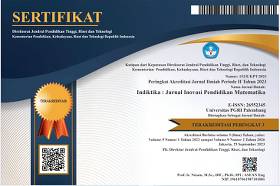UPAYA MENINGKATKAN HASIL BELAJAR MATEMATIKA SISWA SMA MELALUI MODEL PEMBELAJARAN KOOPERATIF TIPE SNOWBALL THROWING
DOI:
https://doi.org/10.31851/indiktika.v1i2.3191Abstract
Penelitian ini bertujuan mengumpulkan dan menganalisis data tentang upaya meningkatkan hasil belajar matematika melalui model pembelajaran kooperatif tipe Snowball Throwing pada kelas XII IPA 3 SMA Negeri 18 Palembang. Penelitian ini menggunakan penelitian tindakan kelas (classroom action research) sebanyak dua siklus. Setiap siklus terdiri dari empat tahap, yaitu : rancangan, kegiatan dan pengamatan, refleksi, dan revisi. Subjek penelitian ini adalah siswa kelas XII IPA 3 SMA Negeri 18 Palembang Tahun Pelajaran 2015/2016. Dari hasil analisis didapatkan bahwa hasil belajar siswa mengalami peningkatan dari pra siklus, siklus I sampai siklus II, yaitu pra siklus (42,11%), siklus I (68,42%), siklus II (86,84%). Simpulan dari penelitian ini adalah model pembelajaran kooperatif tipe Snowball Throwing dapat berpengaruh positif terhadap hasil belajar peserta didik Kelas XII IPA 3 SMA Negeri 18 Palembang, serta model pembelajaran ini dapat digunakan sebagai salah satu alternatif pembelajaran matematika.
 Kata kunci : Hasil belajar, matematika,  Snowball Throwing
Â
ABSTRACT
This study aims to collect and analyze data about efforts to improve mathematics learning outcomes through the Snowball Throwing cooperative learning model in class XII Science 3 of SMA Negeri 18 Palembang. This study uses classroom action research as much as two cycles. Each cycle consists of four stages, namely: design, activity and observation, reflection, and revision. The subjects of this study were students of class XII Science 3 of SMA Negeri 18 Palembang in the 2015/2016 Academic Year. From the results of the analysis found that student learning outcomes have increased from pre-cycle, cycle I to cycle II, namely pre-cycle (42.11%), cycle I (68.42%), and cycle II (86.84%). The conclusion of this research is the Snowball Throwing cooperative learning model can positively influence the learning outcomes of Class XII Science 3 students of SMA Negeri 18 Palembang, and this learning model can be used as an alternative to mathematics learning.
Keywords : Learning outcomes, mathematics, Snowball Throwing
References
Hamalik, Oemar, 2007. Manajemen Pengembangan Kurikulum. Bandung: PT. Remaja Rosda Karya.
Hidayanto. 2006. Model-model Pembelajaran Efektif. Jakarta: PT. Bumi Aksara.
Ibrahim, Uslim. 2000. Pembelajaran Kooperatif . Surabaya: Surabaya University Press.
Kemmis, S. and Mc. Taggart, R. 1988. The Action Research Planner. Victoria: Dearcin University Press.
Kunandar. 2013. Langkah Mudah Penelitian Tindakan Kelas Sebagai Pengembangan Profesi Guru . Jakarta: PT. Raja Grafindo Persada.
Mulyasa, E. 2005. Kurikulum Berbasis Kompetensi. Bandung: Remaja Rosdakarya.
Purwanto, N. 2011. Prinsip-prinsip dan Teknis Evaluasi Pengajaran. Bandung: Remaja Rosda Karya.
Sagala, S. 2010. Konsep dan Makna Pembelajaran. Bandung : Alfabeta.
Sudjana, N. 2009. Penilaian Hasil Proses Belajar Mengajar. Bandung: Remaja Rosdakarya.
Suprijono, A. 2011. Cooperative Learning Teori dan Aplikasi PAIKEM. Yogyakarta: Pusaka Pelajar.
Undang-undang Sistem Pendidikan Nasional (UU Sisdiknas) No. 20 Tahun 2003.
Uno. 2007. Profesi Kependidikan. Jakarta: Bumi Aksara.
Downloads
Published
Issue
Section
License
This work is licensed under a Creative Commons Attribution-ShareAlike 4.0 International License.
Authors who publish with this journal agree to the following terms:
- Authors retain copyright and grant the journal right of first publication with the work simultaneously licensed under a Creative Commons Attribution License that allows others to share the work with an acknowledgement of the work's authorship and initial publication in this journal.
- Authors are able to enter into separate, additional contractual arrangements for the non-exclusive distribution of the journal's published version of the work (e.g., post it to an institutional repository or publish it in a book), with an acknowledgement of its initial publication in this journal.
- Authors are permitted and encouraged to post their work online (e.g., in institutional repositories or on their website) prior to and during the submission process, as it can lead to productive exchanges, as well as earlier and greater citation of published work.













